
First Light is an album by jazz trumpeter Freddie Hubbard. Recorded in 1971, it features string arrangements by Don Sebesky. It was his third album released on Creed Taylor's CTI label and features performances by Hubbard, Herbie Hancock, Eric Gale, George Benson, Ron Carter, Jack DeJohnette, Airto Moreira and Richard Wyands. The album is part of a loose trilogy including his two previous records at the time, Red Clay and Straight Life. First Light won a 1972 Grammy Award for "Best Jazz Performance by a Group".

Sky Dive is the twentieth album by jazz trumpeter Freddie Hubbard, recorded in 1972. It was his fourth album released on Creed Taylor's CTI label and features performances by Hubbard, Keith Jarrett, George Benson, Ron Carter, Billy Cobham, Airto Moreira and Ray Barretto.

Polar AC is a compilation album by jazz trumpeter Freddie Hubbard. It was his final album released on Creed Taylor's CTI label and features performances by Hubbard, Hubert Laws, George Benson, Junior Cook, and Ron Carter. It was put together by CTI after Hubbard left the label to go to Columbia, and the tracks were recorded at different sessions, between 1971 and 1973. The album featured pieces: "People Make the World Go Round" and "Betcha, By Golly Wow", recorded both on April 12, 1972, and "Son of Sky Dive" recorded around 1973. "Polar AC" came from First Light sessions, whilst "Naturally" was recorded during Sky Dive sessions, and both can be found on CD reissues of their respective albums.

Guitar Forms is a 1965 album by Kenny Burrell, featuring arrangements by Gil Evans. Evans' orchestra appears on five of the album's nine tracks, including the nearly 9-minute "Lotus Land". Three tracks are blues numbers in a small group format and there is one solo performance: "Prelude #2".
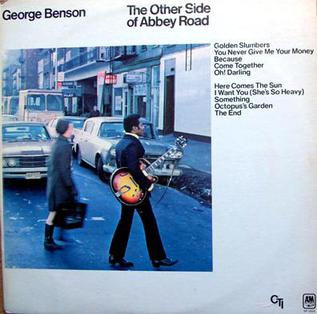
The Other Side of Abbey Road is a 1970 studio album by American guitarist George Benson of songs from the Beatles' 1969 album Abbey Road. It was his last album for A&M Records. The front cover is a photograph of Benson by Eric Meola in E 53rd Street, Midtown East, New York City.
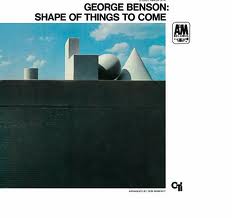
Shape of Things to Come is the fifth studio album by the American guitarist George Benson, recorded in 1968 and arranged by Don Sebesky. It was his first album for A&M Records and his first album to be produced by Creed Taylor, who would remain his producer until 1976.

Beyond the Blue Horizon is a 1971 studio album by American jazz guitarist George Benson. It was his first album released by CTI and included organist Clarence Palmer, drummer Jack DeJohnette, bassist Ron Carter, and percussionists Michael Cameron and Albert Nicholson.

Road Song is an album by the jazz guitarist Wes Montgomery, released in 1968. It reached number one on the Billboard Jazz album chart and number 39 on the R&B chart. It also reached number 94 on the Billboard 200. It was his final recording before his death of a heart attack on June 15, 1968.
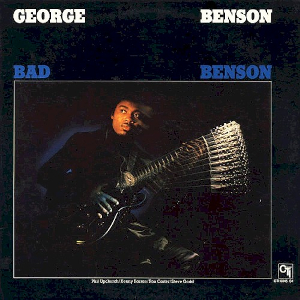
Bad Benson is a 1974 studio album by American guitarist George Benson, released on CTI Records.
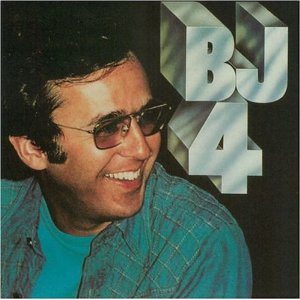
BJ4 is the fourth album by jazz pianist Bob James. Released in 1977, the album charted at number three on the Jazz Album Charts. This would be his last CTI album before starting his label Tappan Zee Records, named for one of the tracks on this album.

Soul Box is the third studio album by American saxophonist Grover Washington Jr. The project was originally divided in two LPs, both released in 1973 on Kudu Records with quite identical covers as Soul Box Vol. 1 (KU-12) and Soul Box Vol. 2 (KU-13), then issued as a 2-LP set as KUX-1213. Both albums were recorded during March 1973 with the same personnel. With the rising of CD's Soul Box Vol. 1 & Soul Box Vol. 2 were reissued on CD by Motown in the early 1990s. Unfortunately Vol. 2 was mastered incorrectly with a totally wrong track separation. Original tracks #1 + #2 were combined into 1 single track of 17 minutes, track #3 was cut as track #2 and track #4 was cut as track #3. Subsequently a totally wrong printing on the CD and the back cover of the CD was performed: The CD contained & listed only 3 tracks. The printed titles were not matching the corresponding tracks and were stated with wrong durations, not matching the original songs of the LP. It took until 2008, when the two volumes were released on one CD by Verve/GRP Records to get the tracks right again with their track separations and title durations back to the original recordings from the Kudu LP's.

All the King's Horses is the second album by American saxophonist Grover Washington Jr. It was recorded in 1972 and released on Kudu Records the same year. In 2008, it was reissued on CD by Verve/GRP Records.

Sunflower is an album by vibraphonist Milt Jackson recorded in 1972 and released on the CTI label. Assisting Jackson are trumpeter Freddie Hubbard, a star-studded rhythm section composed chiefly of Miles Davis alumni, and, on the first track, string and woodwind accompaniment, courtesy of Don Sebesky.

Summertime is a 1969 album by American jazz saxophonist Paul Desmond featuring performances recorded in 1968 and released on the CTI label.
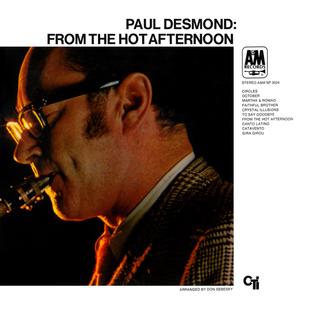
From the Hot Afternoon is an album by American jazz saxophonist Paul Desmond featuring performances recorded in 1969 and released on the CTI label.

Blue Moses is an album by American jazz pianist and composer Randy Weston featuring performances recorded in 1972 and released on the CTI label.

Time & Love is an album by American vocalists Jackie Cain and Roy Kral featuring performances recorded in 1972 and released on the CTI label.

Free is an album by Brazilian jazz drummer and percussionist Airto Moreira with performances recorded in 1972. The album was released by CTI Records and reached No. 30 on the jazz album chart at Billboard magazine.

Giant Box is a double album by American arranger/conductor and composer Don Sebesky recorded in 1973 and released on the CTI label.

Higher Ground is an album by jazz organist Johnny Hammond recorded for the Kudu label in 1973.




















